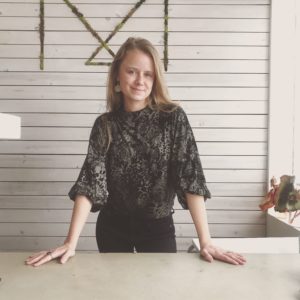Cedar Hughes-Blades considers herself fortunate to have found cannabis early in life—despite growing up in Kentucky, which heavily prosecuted against it. She used cannabis medicinally as a teenager to successfully combat the anxiety and depression she experienced during high school. Wanting to avoid legal trouble over a substance she considered medicine; Cedar moved out of Kentucky when she was 19 to be a medical patient in Colorado. While she didn’t work directly in the industry at first, being a medical patient meant she worked with a caregiver who taught her a lot about how to grow when she would go to the farm to receive her monthly increments of flower. That solidified her fate in an industry that would take her to many places.
“It wasn’t until I tried cannabis from California that I got really passionate about growing outdoors in a way that is true to the plant and true to the earth,” Cedar said. “I came out to the West Coast and really dove into the culture of the Emerald Triangle in Northern California and Southern Oregon. I love that I got to have that experience when it was still beginning.”
Finding better medicinal options from outdoor-grown cannabis, Cedar moved to Oregon, where she joined the medical program and started working at a medical grow and dispensary before the state legalized its recreational use.
“I learned how to grow outdoors, the trimming, the cultivation, all of it,” she said. “In Oregon, we have some of the best microclimates and quality of soil to grow cannabis, so it’s not necessary in our state to have to use a lot of technology or processed nutrients to grow flower.”
Next, Cedar made a move to Portland to work for Green Goddess Remedies doing operations management, a role she came into because of her years of experience working with cannabis as a patient. When she left Colorado for Oregon, Cedar had a solid level of foundational training from her experiences with her caregiver and the plant.
“Most people didn’t have a long history to speak about at this point because cannabis was still unregulated,” Cedar said. “You had to be brave to even talk about your experience with cannabis back then.”
Seeing the Cannabis Industry from All Angles:
Cedar has held a few different positions in the industry and prides herself on having seen so many different angles of this business. While she didn’t do that intentionally, it has given her a well-rounded view of how everything works. Now, as a purchasing manager for dispensaries, she looks for products that she would want to buy herself from good-intentioned business owners.
“I would not be able to work for a company if I did not enjoy their products,” she said. “I’ve been very selective about the companies I have worked in this industry.”
As operations and purchasing manager at Mongoose Cannabis, Cedar admits those are two massive hats to be wearing at the same time, but she also sees how those roles go hand in hand.
“I am very passionate about picking the products that go on our shelves because I have a pretty good idea of what people want,” Cedar said. “I’ve been a medical patient since I was 19, I’m about to be 30. I have had a lot of experience with all of the products on the Oregon market, and I know which have the quality I look for as a consumer with growing methods that I want to support.”
Cedar was one of the first to join the Mongoose Cannabis team. Deb and Chuck Grant are husband and wife owners of the company and new to retail cannabis despite being in the neighborhood for nearly 30 years. They were looking to bring their own distinctive flair to the industry.
“The owners of Mongoose heard an interview I did on an episode of the Periodic Effects Podcast talking about picking the right products for your shop and making sure that budtenders are trained to speak about those products,” Cedar said. “They contacted me to see if I was interested in the position, so I met with Deb and Chuck. They are such incredible people with an offer I just couldn’t refuse.”
The couple designed and built their dispensary entirely by themselves and then brought in Cedar to handle the purchasing, hiring, and other operational elements. The team is still small, a choice made by design.
“We’ve kept things small because we believe in the importance of paying a living wage,” Cedar said. “A small team means everyone can get the hours they want and make enough to support their family.”
Mainly a female group, particularly the ownership and marketing team, all of the creative energy at Mongoose Cannabis is driven by women. Chuck, the “Pop” of this mom-and-pop organization, focuses on building their visions. Cedar said she loves working for a husband and wife team.
“Deb and Chuck are incredible, down to earth, good people,” Cedar said. “You would expect a husband-wife team to bicker at the office, but these two don’t. They create this maternal vibe within the team; you can ask them for advice or talk to them about life. There is a family atmosphere here.”
The Mongoose Cannabis Name:
Cedar explained that the mongoose is a pretty cool animal, one of the few that can take down a snake because they are immune to the venom.
“We see the mongoose as this totally adorable yet fierce creature,” she said. “We might look cute and snuggly, but we can take down the cobra when the time comes.”
For their team, the cobra represents big conglomerates and big farms coming into the industry.
“We are the cute mongoose here to do things right as an extension of the community, and to stand up to big industry,” Cedar said.
Being a Woman in the Cannabis Industry:
She noted it is rare that she meets female growers or owners when she goes out to visit facilities. She did remember one encounter vividly with a female grower.
“There is one woman I met with, and she brings her boyfriend around with her in case she is dealing with a buyer at a shop who isn’t hearing her as a female,” she said. “Even though it’s her grow, she wrote the business plan, and built the facility, she still brings her boyfriend around just in case she finds a buyer who doesn’t respect her as a female grower.”
Cedar said that absolutely would never happen in her office, so the boyfriend never spoke a word during their meeting. Towards the end of their talk, Cedar asked him, “What do you do at the company?” He responded, “I just come around to take conversations for her.”
“Wow, what a realization that a woman would actually have to do that,” Cedar recalled. “He said flat out that she knew way more about all of this stuff than he did, but there is that old sales mentality that female growers might not know what they are talking about.”
With a unique name like Cedar, people often don’t know whether she is male or female before they meet her, which sometimes can play to her advantage.
“Sometimes I’ll get a text from a business owner, and they’ll say ‘alright dude’ or ‘OK brother,’ and I think, ‘you’re going to be surprised when you meet me,’” she said. “Then they meet me and think, ‘oh weird; I haven’t been treating her differently because I thought she was a man.’”
It was also hard for Cedar to get into the industry in the beginning as a woman, and still struggles with not being taken seriously.
“As a buyer, I still deal with this from customers and vendors alike,” she said. “They think because I’m a woman that I might not check the quality of a product before purchasing, but they quickly learn that is not the case. I like to show my knowledge when I walk into a company. I’ve gotten to this place with a lot of hard work and hands-on experience.”
In her final thoughts, Cedar said she would like to see more inclusivity built in the cannabis industry.
“We’re all here to support each other, and there is enough room at the table for everyone,” she said.
You May Have Missed:


